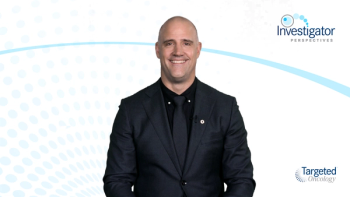
Case Patient Prognosis
Dr Hart explains his prognosis for our case patient.
Lowell Hart, MD, FACP: Well, this patient, based on the data that we have from the trials like monarchE should have a reasonably good prognosis.
Now, this is a sort of case that when I was a young doctor in training, I would tell a patient like this that their odds are 50/50 at most really. This is a stage II patient with 3 positive axillary lymph nodes at the time of diagnosis so that showing a cancer that’s acting aggressively and with the treatments that we had in the past, I would tell these patients that if they just had, say in the old days when surgery was mostly what was done, it’s going to be 50/50 at best.
Now in the adjuvant chemotherapy, adjuvant hormonal therapy era, as the decades have gone by the odds are getting much better for the patients. If you look at the monarchE, in general, and again, there’s short follow-up. Of course, this is not a study that we have 20-year data on yet, but the 2 and 3-year data looks very good, looks greater than 90% invasive disease-free survival. That looks excellent.
Now, obviously, there’s going to be some decline as the years go by because we do know that patients with hormone receptor-positive, early breast cancer do have risk of late relapse also. So I would give this patient when she had finished her radiation therapy and chemotherapy.
As I mentioned, I would start her probably on either letrozole [Femara] or anastrozole [Arimidex] plus abemaciclib [Verzenio]. [And] stop the abemaciclib at 2 years. This is the sort of patient that I would, assuming that she was doing well and had adequate bone density and was tolerating the aromatase inhibitor reasonably well, I would continue her probably on more than 5 years going for 7 to 10 years.
That’s been my general practice. There are molecular assays out there now which we will sometimes use in patients especially if they’re a lower risk patient to see whether there’s a benefit to a longer-term use of adjuvant hormonal therapy. But a patient like this with 3 positive nodes and other high-risk factors like a high Ki-67, I would personally assuming the patient was doing well, give her more than 5 years of adjuvant hormonal therapy.
I certainly have seen in my years in practice patients, even 10 and 15 years out, have late relapses from a hormonal receptor-positive primary breast cancer. I am, in general, an advocate of longer-term use of aromatase inhibitor assuming that the patient is tolerating it reasonably well. That would be my plan for this patient.
If she ever did have a relapse, I would probably try to re-biopsy her and see the extent of whether she still had hormone receptors or not. We would look for ESR-1 [estrogen receptor gene 1] mutations, which are sometimes seen in patients who relapse, which would make them resistant to an aromatase inhibitor.
It would depend a little bit on the site of relapse and the time that had elapsed from the patient’s end of her hormonal adjuvant therapy until the time of relapse, what treatment we would offer the patient.
If the patient had a reasonable timeframe and had bone-only metastases, I would then likely offer the patient a treatment, such as fulvestrant [Faslodex] plus 1 of the CDK4/6 inhibitors. We would also look to see if the patient had a PI3K [phosphoinositide 3-kinase] mutation, then you could potentially think about using an inhibitor towards that pathway also.
There are many options that would be open for the patient. Again, depending on the site of the disease and whether it was successful or not, I would at the minimum do a liquid biopsy on the patient at the time of relapse and try to do a tissue biopsy if at all possible.
This transcript has been edited for clarity.
Case:A 54-Year-Old Woman with ER+/PR+ Breast Cancer
Initial Presentation
- A 54-year-old, postmenopausal woman presents with a newly diagnosed lump in her right breast
- She has no family history of cancer and underwent menopause at age 50
Clinical work-up
- Imaging demonstrated a 2.4-cm solid mass in the right upper quadrant with no suspicious lymphadenopathy identified
- Core biopsy: positive for invasive ductal carcinoma, ER 100%, PR 97%; HER2 1+ and FISH negative; Ki-67 45%; modified Bloom-Richardson grade 3
- Lumpectomy and sentinel lymph node biopsy performed
- Tumor size is 2.4 cm, and 3 LNs are positive for metastatic disease
- 21-gene assay recurrence score is 30
- pT2N1M0, stage IIB
- ECOG PS is 0
Treatment
- Patient underwent partial mastectomy with no residual disease
- She is given radiation therapy to intact breast
- She is started on adjuvant chemotherapy with cyclophosphamide and docetaxel
Followed by adjuvant therapy with AI + 2 years of abemaciclib









































